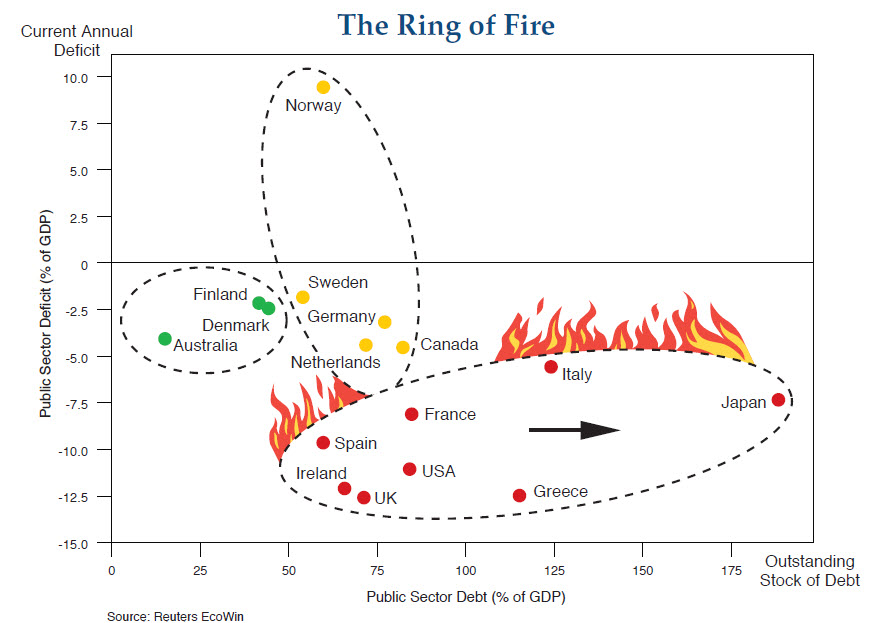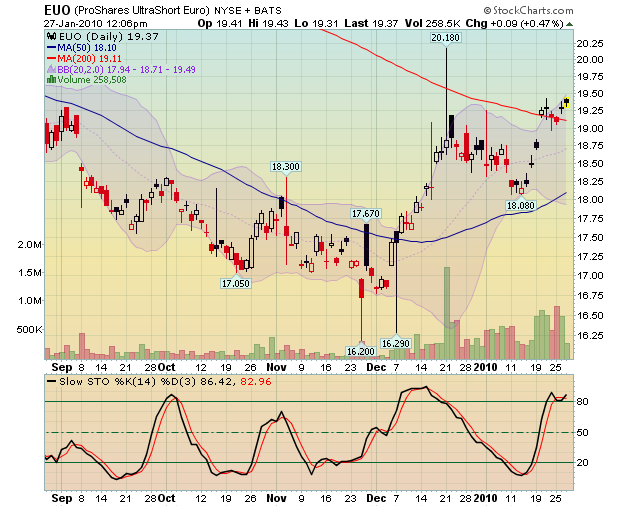Mr. Doom and Gloom (OR is it Doctor) is feeling rather negative again. Come to think of it, I am not quite sure that I have ever seen him with a positive tone.
 This time he is worried about the fate of the Euro. AND, I agree with him. The difficulty with trying to balance multiple economies with one currency was the main concern when establishing the Euro. Now that we are watching a recovery that is vastly divergent within the EU, there is a great deal to worry about.
This time he is worried about the fate of the Euro. AND, I agree with him. The difficulty with trying to balance multiple economies with one currency was the main concern when establishing the Euro. Now that we are watching a recovery that is vastly divergent within the EU, there is a great deal to worry about.
Just this week, Pimco’s Bill Gross put out a terrific commentary that poised a few questions regarding the quality of the debt throughout the world. below is a chart that shows how he perceives the risk of the government debt.
So, if the chance for a decoupling within the Euro zone occurs, how do you play, aside from simply staying away from European stocks? Short the Euro through the Proshares Ultrashort Euro ETF (EUO). This is a leveraged fund, so you need to be aware that if the position moves in your direction, then the profits can add up. On the other hand, due to the daily calculation, if there is a choppy/volatile move (up and down) this may be a real drag, even if you are right with the longer-term trend.
From Bloomberg:
New York University Professor Nouriel Roubini said he‘s never been more pessimistic about the future of European monetary union, saying Spain poses a looming threat to the euro region holding together.
“Down the line, not this year or two years from now, we could have a breakup of the monetary union,” Roubini said in a Bloomberg Radio interview from the World Economic Forum‘s annual meeting in Davos, Switzerland. “It‘s a rising risk.”
Roubini‘s concern contrasts with the view of European Central Bank President Jean-Claude Trichet who said it‘s “absurd” to imagine that the 16-nation euro area could splinter. Speculation of a breakup has mounted in financial markets as Greece struggles to cut the continent‘s biggest budget deficit and countries from Spain to Ireland face rising debt burdens.
“The euro zone could drift essentially with a bifurcation, with a strong center and a weaker periphery and eventually some countries might exit the monetary union,” said Roubini, who predicted the recent financial crisis a year before it began. “This is the very first test” of the single currency bloc.
Economies including Spain and Greece are threatened by fiscal imbalances and declining competitiveness, Roubini said. Membership in the euro means they can no longer devalue the currency to export their way out of recession, he said.
Commission Deadline
The Greek budget deficit ran more than four times the European Union limit of 3 percent of gross domestic product last year and Greece is one of 13 nations facing deadlines from the European Commission to cut its shortfall. The country‘s debt is set to top 120 percent of GDP this year, the highest in the euro region and twice the limit for adopting the single currency.
Trichet on Jan. 14 dismissed as an “absurd hypothesis” the argument that Greece could be forced to exit the euro area. The country should remain in the union where its problems “will be unequivocally easier to solve,” central bank governor George Provopoulos said in the Financial Times on Jan. 22.
Roubini said for all the focus on Greece, Spain may eventually pose a bigger threat to the euro zone because it‘s the region‘s fourth-largest economy and has higher unemployment and weaker banks. Spain‘s jobless rate is more than 19 percent, almost twice the EU average.
“If Greece goes under that‘s a problem for the euro zone,” he said. “If Spain goes under it‘s a disaster.”
Bond Vigilantes
Roubini described rising sovereign risk as a “new phenomenon” for advanced economies that will complicate their recoveries from the worst global recession since World War II.
So-called bond vigilantes, or investors who punish governments by dumping their debt, “have been asleep at the wheel,” outside of Europe, Roubini said. The risk premium investors demand to buy 10-year Greek debt over comparable German bonds rose to an 11-year high of 312 basis points on Jan. 22.
“Eventually they could wake up” in Japan and the U.S. and sell off their bonds as they did with Greece.
“We have a massive fiscal problems in most of the advanced economies, and we‘re not really dealing with it,” he said.
After Standard & Poor‘s yesterday lowered its sovereign credit rating outlook on Japan, Roubini said he was “worried” about the world‘s second-largest economy as its debt mounts, deflation returns and population ages. While it can currently finance itself thanks to domestic savers, at some point they may “flee the yen,” pushing up borrowing costs and crippling the economy, he said.
___
Disclosure: Horowitz & Company clients may hold positions of securities mentioned as of the date published.


















